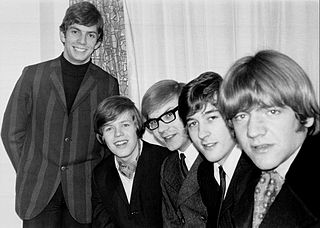
Herman's Hermits are an English rock and pop group formed in 1963 in Manchester and fronted by singer Peter Noone. Known for their jaunty beat sound and Noone's often tongue-in-cheek vocal style, the Hermits charted with numerous transatlantic hits in the UK and in America, where they ranked as one of the most successful acts in the Beatles-led British Invasion. Between March and August 1965 in the United States, the group logged twenty-four consecutive weeks in the Top Ten of Billboard's Hot 100 with five singles, including the two number ones "Mrs. Brown You've Got a Lovely Daughter" and "I'm Henry VIII, I Am".
"A Song for You" is a song written and originally recorded by rock singer and pianist Leon Russell for his first solo album Leon Russell, which was released in 1970 on Shelter Records. A slow, pained plea for forgiveness and understanding from an estranged lover, the tune is one of Russell's best-known compositions. Russell sang, played piano, and played tenor horn on the recording. It has been performed and recorded by over 200 artists, spanning many musical genres.The Encyclopedia of Country Music, 2012: "In 1970 Russell released his self-titled debut solo album, including such enduring songs as 'Delta Lady' and 'A Song for You,' both written for versatile vocalist Rita Coolidge.

"The Way We Were" is a song by American singer Barbra Streisand from her fifteenth studio album of the same name. It was released as the album's lead single on September 27, 1973, through Columbia Records. The 7" single was distributed in two different formats, with the standard edition featuring B-side track "What Are You Doing the Rest of Your Life?"; the Mexico release instead included an instrumental B-side. The song was written by Alan Bergman, Marilyn Bergman, and Marvin Hamlisch, while production was solely handled by Marty Paich. "The Way We Were" was specifically produced for the record, in addition to three other tracks, including her then-upcoming single "All in Love Is Fair" (1974).
"Oh! You Pretty Things" is a song by the English singer-songwriter David Bowie from his 1971 album Hunky Dory. It was the first song he wrote for the album. Bowie recorded the song as a demo before giving it to singer Peter Noone, lead singer of Herman's Hermits, who decided to release it as his debut solo single. Featuring Bowie on piano, Noone's recording was produced by Mickie Most and featured structural and lyrical differences from Bowie's later version. Released by RAK Records in April 1971 under the title "Oh You Pretty Thing", the single peaked at number 12 in the UK, becoming Bowie's biggest success as a songwriter since his own single "Space Oddity" two years earlier.

"Solitaire" is a ballad written by Neil Sedaka and Phil Cody. Cody employs playing the card game of solitaire as a metaphor for a man "who lost his love through his indifference"—"while life goes on around him everywhere he's playing solitaire". The song is perhaps best known via its rendition by Carpenters. Another version by Andy Williams reached number 4 in the UK Singles Chart in 1973.

"I Won't Last a Day Without You" is a song by The Carpenters with lyrics written by Paul Williams and music composed by Roger Nichols. The writing duo had previously contributed "We've Only Just Begun" and "Rainy Days and Mondays" to the Carpenters.
Anthony "Tony" Hazzard is an English singer and songwriter. He has written songs for The Hollies, Manfred Mann, "Me, The Peaceful Heart" for Lulu, The Yardbirds, Herman's Hermits, Peter Noone, The Tremeloes, Gene Pitney, Richard Barnes, and Andy Williams amongst others.
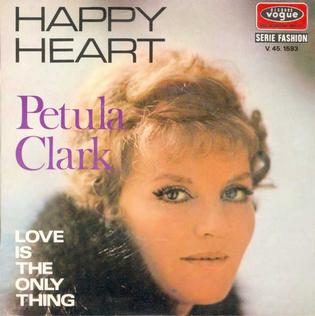
"Happy Heart" is a song written by James Last and Jackie Rae. Versions of the song by Petula Clark and Andy Williams charted simultaneously in 1969 and had their best showings on Billboard magazine's Easy Listening chart, where Clark peaked at number 12 and Williams spent two weeks at number 1.

Days of Wine and Roses and Other TV Requests is the eleventh studio album by American pop singer Andy Williams and was released in April 1963 by Columbia Records following his first season as host of his variety series, The Andy Williams Show. The LP has a studio recording of the closing theme from the show, "May Each Day", and continues the format of his previous Columbia releases by including songs from the 1920s, 1930s, 1940s, and 1950s.

Andy Williams' Dear Heart is the sixteenth studio album by American pop singer Andy Williams and was released in the spring of 1965 by Columbia Records and was the last of his Columbia releases that remained exclusively within the realm of traditional pop. After covering two Beatles hits on his next non-holiday studio album, The Shadow of Your Smile, he would try out samba music on In the Arms of Love, aim for a much younger crowd with "Music to Watch Girls By" on Born Free, and focus more on contemporary material on subsequent albums.
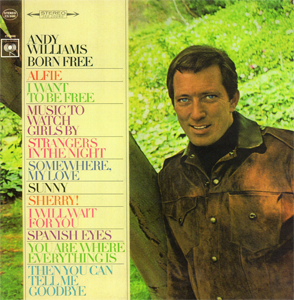
Born Free is the twentieth studio album by American pop singer Andy Williams and was released on April 10, 1967, by Columbia Records and includes half a dozen songs associated with movies or musicals. Two of these tracks, however, originated in the scores of the films indicated on the album jacket but had lyrics added later: the melody for "Strangers in the Night" was written for A Man Could Get Killed, and "Somewhere My Love" began as "Lara's Theme" from Doctor Zhivago.
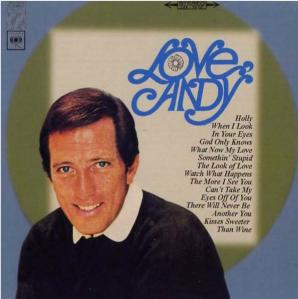
Love, Andy is the twenty-first studio album by American pop singer Andy Williams, released on October 16, 1967, by Columbia Records to coincide with the NBC special of the same name, which aired on November 6. The LP had a mix of covers of old and recent hits that included two songs from the 1940s that also had chart success in 1966 via Chris Montez: "The More I See You" and "There Will Never Be Another You".

Raindrops Keep Fallin' on My Head is the twenty-fifth studio album by American pop singer Andy Williams and was released in the spring of 1970 by Columbia Records. Williams was less focused on covering recent hits on this project and instead selected several songs from the singer-songwriter genre. The concept for the album came from Mason Williams, who contacted producer Dick Glasser about co-producing an album that would give Williams's fans a medley of songs that did more than just highlight the most familiar parts of popular songs but rather focus on a unifying theme or storyline of songs that were not necessarily hit records. Billboard magazine opined that the album "may well be titled 'A Journey Through Life.' Through carefully selected songs it conveys a message of dreams, hopes, reality, frustrations and ultimate truth."

Love Story is the twenty-seventh studio album by American pop singer Andy Williams that was released on February 3, 1971, by Columbia Records. This was another in his series of cover albums, but the title track, subtitled "Where Do I Begin", was the one song included that he originated.
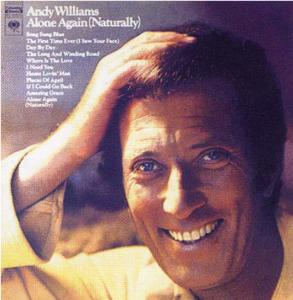
Alone Again (Naturally) is the thirtieth studio album by American pop singer Andy Williams, released in September 1972 by Columbia Records and mainly consisting of songs originated by other artists. For its release in the UK, the album was titled The First Time Ever (I Saw Your Face), and three of the songs were replaced with the 7-inch single tracks "Who Was It?" and "Marmalade, Molasses & Honey" and a recording that was not released on vinyl in the U.S., "If You're Gonna Break Another Heart".
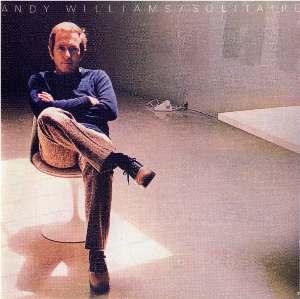
Solitaire is the thirty-first studio album by American pop singer Andy Williams, released in the fall of 1973 by Columbia Records and was an attempt to move away from his formulaic series of recent releases that relied heavily on songs that other artists had made popular.

The Way We Were is the thirty-second studio album by American pop singer Andy Williams, released in the spring of 1974 by Columbia Records and was a return to singing songs that his audience was already familiar with after Solitaire, his previous LP that was less reliant on covers of recent pop hits, did not perform well.

You Lay So Easy on My Mind is the thirty-fourth studio album by American pop singer Andy Williams, released in November 1974 by Columbia Records. The idea for this LP was mentioned in an interview with Williams in the November 3, 1973, issue of Billboard magazine that emphasized his desire to move away from recording albums of Easy Listening covers of hits by other artists, noting that he was "planning an album to be cut in Nashville with Columbia's high-flying country-pop producer, Billy Sherrill." The article coincided with the release of his first attempt to shift directions, Solitaire, which performed poorly. A return to the Easy Listening hits formula, The Way We Were, followed in the spring of 1974 but failed to even chart, so this next attempt to eschew soft rock songs leaned heavily on Country hits.

The Other Side of Me is the thirty-fifth studio album by American pop singer Andy Williams, released in the summer of 1975 by Columbia Records and including the 1973 recording of "Solitaire" from his album of the same name alongside 10 original recordings, four of which were also by "Solitaire" composer Neil Sedaka. After unsuccessful attempts to leave behind the formulaic album genre of easy listening covers of pop hits, The Other Side of Me offered a compromise by filling half of the sides with material that was popularized by other artists and the other half with either new or obscure selections.

Andy Williams' Greatest Hits Vol. 2 is a compilation album by American pop singer Andy Williams that was released in June 1973 by Columbia Records. This collection follows in the footsteps of its predecessor, Andy Williams' Greatest Hits, in that it is not limited to his biggest and most recent hit singles, although his final two US Top 40 entries were included. It also has an album track not released as a single, a couple of hits from his time with Cadence Records, two other singles that could have been included on the first volume, and two Easy Listening chart entries that never made the Billboard Hot 100.

















